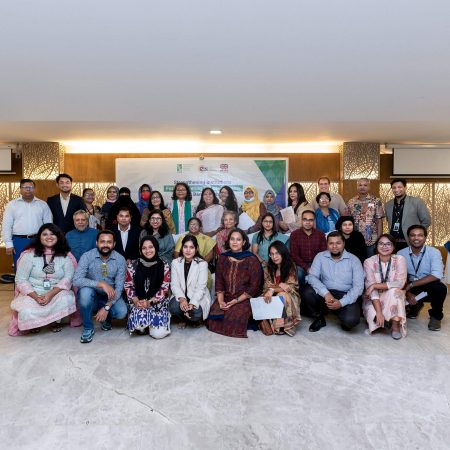Strengthening Institutions for Empowering Female Migrants in Bangladesh

On May 12th, 2022, the International Food Policy Research Institution (IFPRI), the University of Dhaka, Lincoln University, and Australian National University, together with Green Ink as the technical support provider, organized a dissemination workshop titled “Strengthening Institutions for Empowering Female Migrants in Bangladesh.” The team of Green Ink has supported organizing the workshop at Lakeshore Hotel, Gulshan 2, Dhaka, Bangladesh, to present the findings of the previous research “Gender-sensitive Risk and Options Assessment for Decision-Making (ROAD) to Support Work in Freedom 2 (WiF 2)” and explore future research prospects for minimizing the risk of Bangladeshi women migrants to Arab countries.
The purpose of the dissemination workshop was to highlight the struggles and challenges faced by female Bangladeshi migrant workers who choose to work in the Middle East. Sheuly, a returnee migrant from Jordan, shared her story during the workshop. She said she had worked in Jordan for four years. However, due to physical illnesses, while working in Jordan, she had to come back to Bangladesh in 2020. Sheuly mentioned that she did not face any ill-treatment or misbehavior during her stay in Jordan, but her workload was significant. The second speaker was Ms. Hazera. She shared her traumatic experience while working in Saudi Arabia and how she returned to Bangladesh. Hazera had to step up to be the breadwinner of her family due to her husband’s illness, as she did not have any family members to depend on. Hazera, unlike Sheuly, was physically assaulted by her employers and had to travel to the medical emergency room to be treated.
The problem is not as simple as it appears; it is far more complicated. Many things go unnoticed and get swept under the rug during migration. Many Bangladeshi women, who dream of having a better life by working overseas, are frequently exploited by everyone around them. So, what responsibilities do we hold as Bangladeshi nations? What can be done for them to ensure their security? How can we change their traumatic faith as participating members of society? As a collective civil society, we need to step up and make sure these women receive essential information and training, know their rights as Bangladeshi citizens and migrants, and assure them that all immigration regulations and policies are followed by those who seek to travel abroad for work.
